Have you ever gone camping and felt the need for a reliable power source? A compact generator can make your outdoor adventure more comfortable and enjoyable. Check out our “Best Generator for Mobile Detailing” article to discover the top 5 compact generators for camping, their key features, benefits, and why they are perfect for your next trip.
Why You Need a Compact Generator for Camping
Camping is a chance to escape the daily grind. It’s a return to nature and simplicity. But simplicity doesn’t mean sacrificing comfort. This is where a compact generator shines. Understanding its value can transform your camping experience.
The Advantages of a Compact Generator
- Convenience: A compact generator brings ease to your camp setup. No more fiddling with unreliable power sources. With a simple push of a button, you have electricity. This convenience allows you to focus on enjoying your surroundings.
- Power for Devices: Modern camping often includes devices like phones, cameras, and even small appliances. A compact generator ensures these devices stay charged. This means you can capture memories, stay connected, and use essential gear without worry.
- Reliability: These generators are built for the outdoors. They are robust and designed to handle various weather conditions. Knowing you have a reliable power source gives you peace of mind. It allows you to camp with confidence, regardless of the environment.
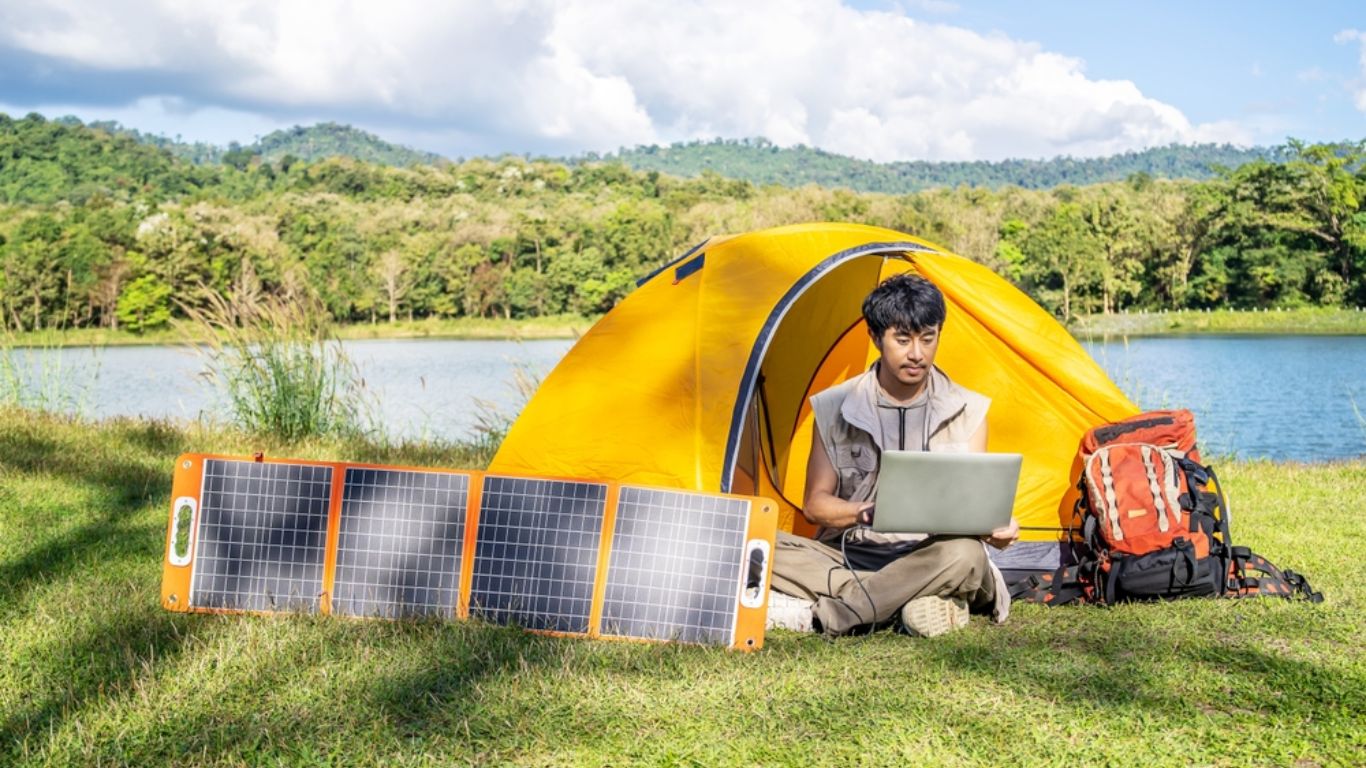
Why You Need a Compact Generator for Camping
The Challenges Without a Generator
- Limited Power: Without a generator, you’re at the mercy of nature. Solar power can be unreliable with cloudy skies. Batteries drain quickly, leaving you without power when you need it most.
- Restricted Device Usage: Lack of power means rationing your device use. You might miss out on capturing special moments or lose contact with the outside world. Essential devices like GPS units or emergency radios might become useless.
- Comfort and Safety: A generator can power lights and small heaters, making your campsite safer and more comfortable. Without it, you rely on flashlights and campfires. This can limit your activities after dark and make your campsite feel less secure.
A compact generator is more than a luxury; it’s a game-changer. It brings convenience, ensures power for devices, and provides reliability. It eliminates common camping challenges, making your outdoor adventure more enjoyable and secure. Invest in a compact generator and enhance your camping experience.
Criteria for Choosing the Best Compact Generator for Camping
Choosing a compact generator for camping is a significant decision. It impacts your comfort and safety, and knowing what to look for makes this task easier. Let’s explore the key criteria to guide your choice.
Portability
Weight and Size: Portability is crucial. You need a generator that is easy to carry and store. Consider the weight and dimensions. A lightweight and compact model ensures it doesn’t become a burden. This makes setup and transport more manageable, enhancing your camping experience.
Power Output
Understanding Wattage: Power Output Matters. Different devices require different wattages. Know the combined wattage of your devices. This helps you choose a generator that meets your power needs. Ensure it can handle the load to avoid disappointment in the wild.
Noise Level
Quiet Operation: Noise can disrupt the tranquility of camping. A quiet generator is essential. Look for models with low decibel ratings. This ensures you enjoy nature without constant noise. It also respects fellow campers, contributing to a peaceful environment.
Fuel Efficiency
Types of Fuel and Runtime: Fuel efficiency affects your camping duration. Understand the types of fuel available—gasoline, propane, or dual-fuel options. Consider the runtime on a full tank. Efficient generators run longer, reducing the need for frequent refueling. This adds convenience and extends your adventure.
Ease of Use
Features for Simplicity: A user-friendly generator enhances your camping experience. Look for features like easy start mechanisms and straightforward maintenance. Generators with clear instructions and minimal upkeep requirements save time and effort. This lets you focus on enjoying your trip.
Selecting the best compact generator for camping involves careful consideration. Focus on portability, power output, noise level, fuel efficiency, and ease of use. These criteria ensure you choose a reliable and convenient power source.
Top 5 Compact Generators for Camping
Best Overall: Honda EU3000i
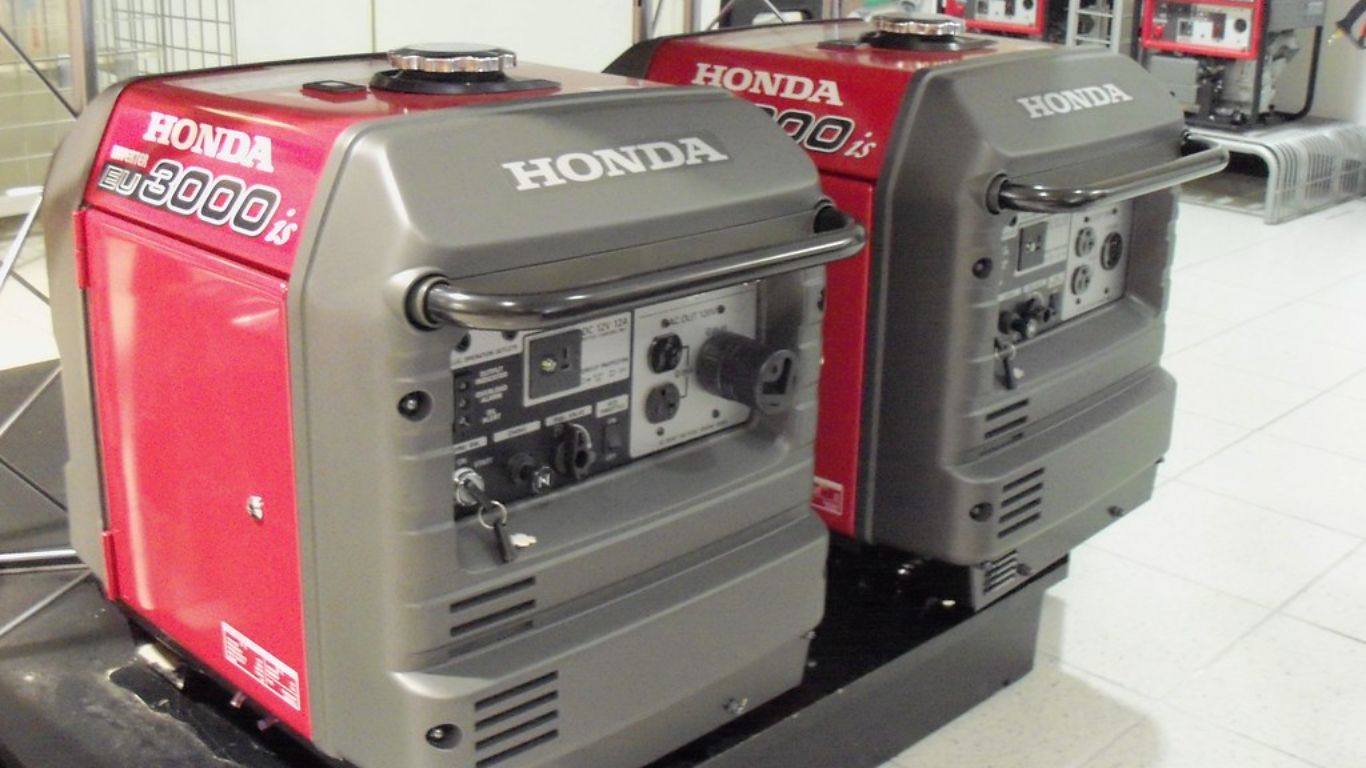
Overview: The Honda EU3000i is a top-tier generator known for its reliability and performance. It delivers 3000 watts of power and operates quietly, making it ideal for various camping needs. It is also equipped with advanced inverter technology, ensuring stable power for sensitive electronics.
| Product Features | Pros | Cons |
|---|---|---|
|
|
|
User Reviews: Users praise its reliability and quiet operation. Many highlight its ability to run for long periods without refueling. Some mention the high cost as a drawback, but they agree it’s worth the investment for peace of mind and high performance.
Best Budget: Craftsman 2500i Inverter
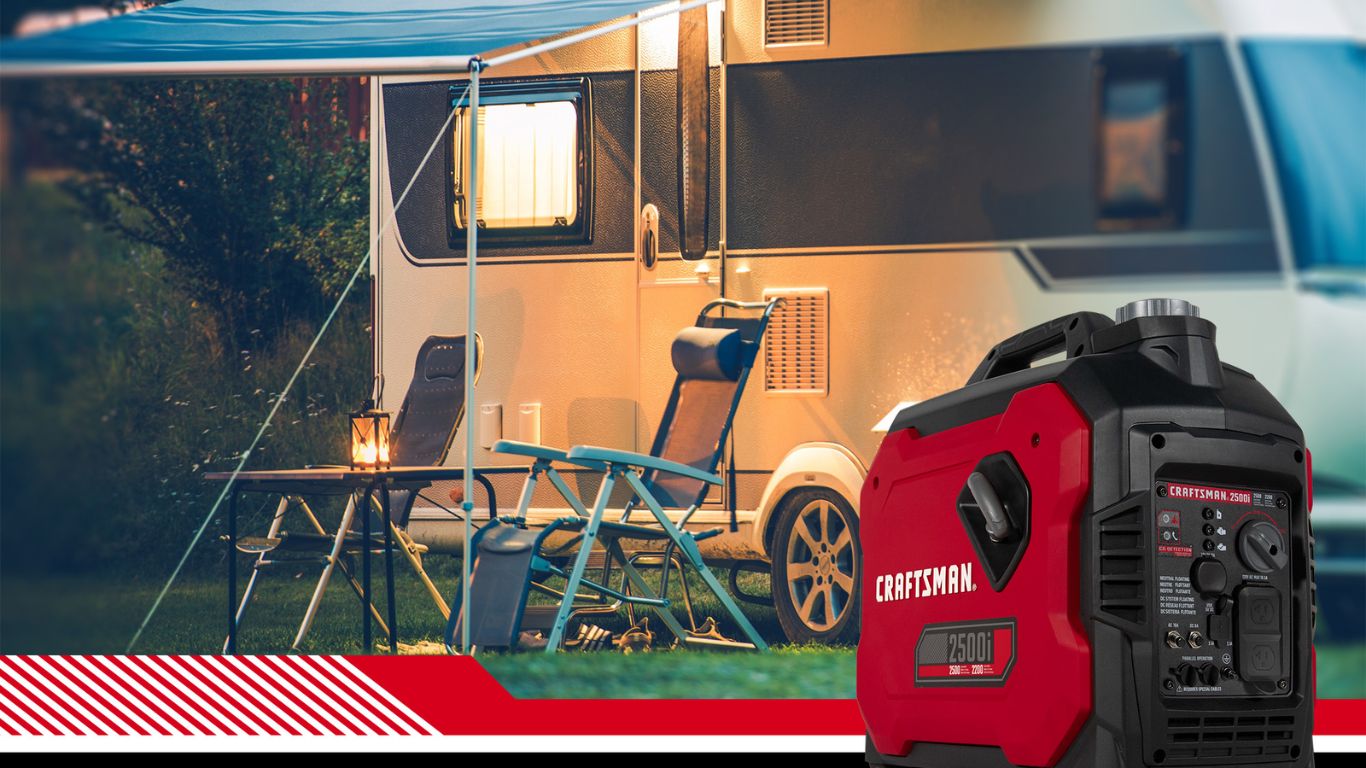
Overview: The Craftsman 2500i is a budget-friendly generator that offers a good balance of power and affordability. It provides 2500 starting watts and 2200 running watts, making it suitable for basic camping needs. Its compact design ensures easy portability.
| Product Features | Pros | Cons |
|---|---|---|
|
|
|
User Reviews: Users appreciate its affordability and ease of use. Many find it sufficient for powering small devices and lights. Some note that it’s louder than they expected but still manageable and suitable for short trips or emergencies.
Most Quiet: Honda EU2200i
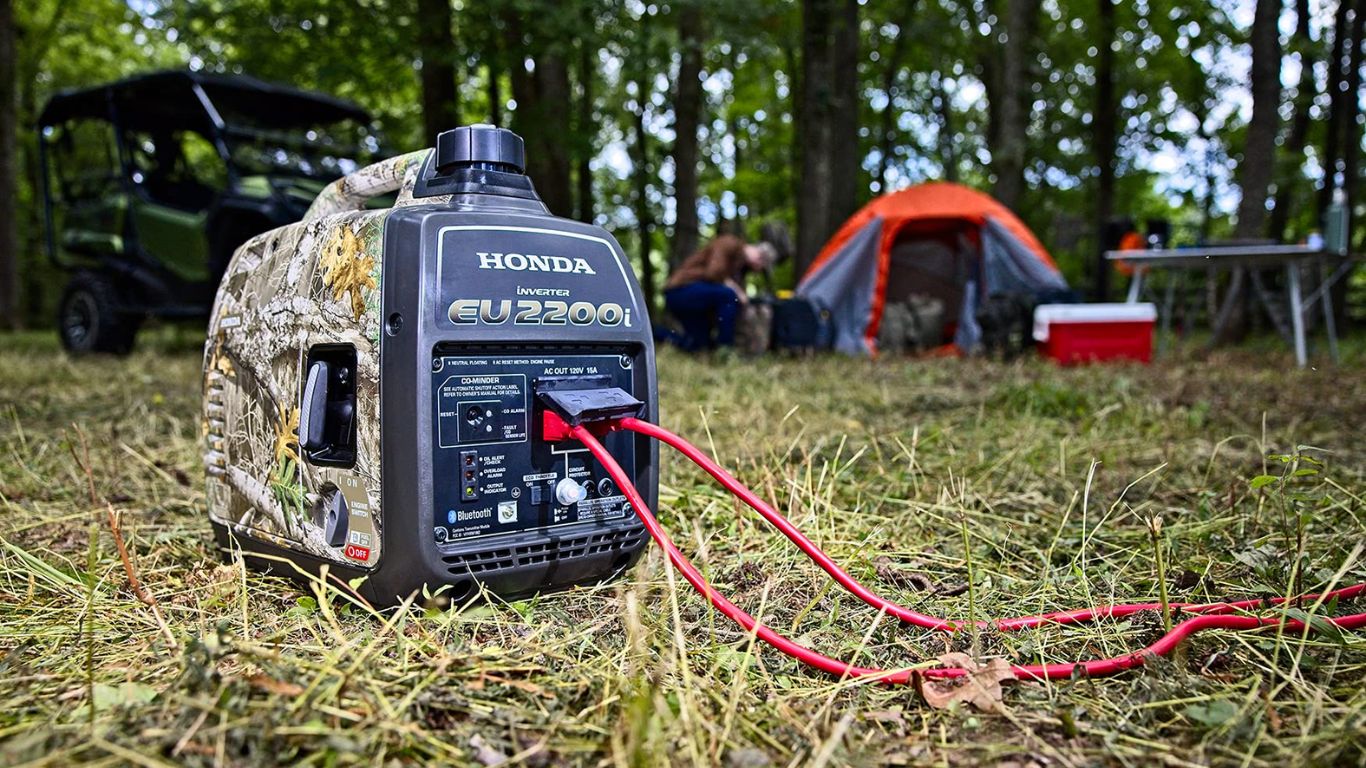
Overview: The Honda EU2200i is renowned for its exceptionally quiet operation. It provides 2200 watts of power and is perfect for noise-sensitive environments like campsites. It also features Honda’s Eco-Throttle system, enhancing fuel efficiency.
| Product Features | Pros | Cons |
|---|---|---|
|
|
|
User Reviews: Users love how quiet it is, often comparing it to a normal conversation. They also appreciate its reliability and fuel efficiency. The higher price is noted, but many believe the quiet operation and dependability justify the cost.
Best for RV: Champion Power Equipment 4500
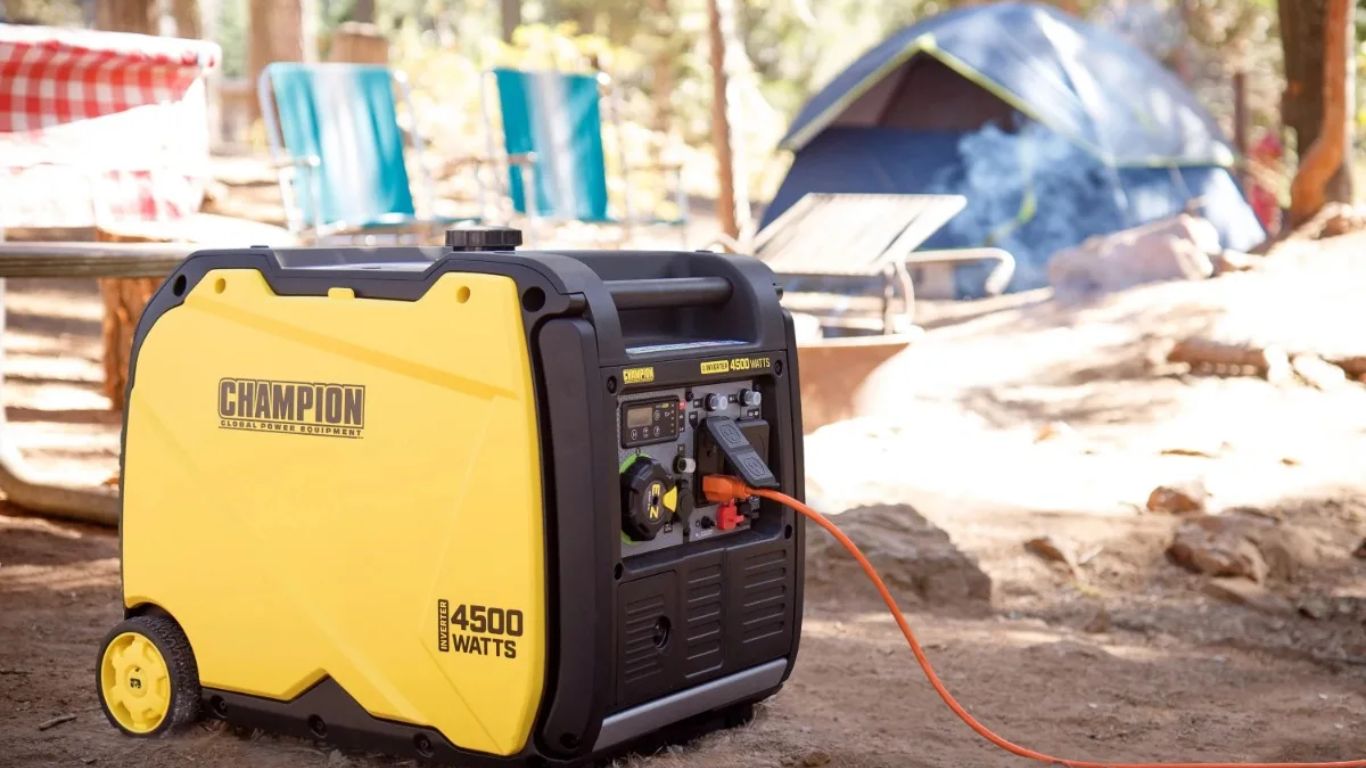
Overview: The Champion Power Equipment 4500 is designed with RV users in mind. It provides ample power with 4500 starting watts and 3500 running watts and includes an RV-ready outlet. It also features a digital display for easy monitoring of power usage and run time.
| Product Features | Pros | Cons |
|---|---|---|
|
|
|
User Reviews: RV owners praise its power output and ease of use. Many appreciate the RV-ready feature and the digital display. Some users mention the weight and noise as minor drawbacks, but they still recommend it for RV camping due to its power and convenience.
Best Small: Yamaha EF2200iS Inverter
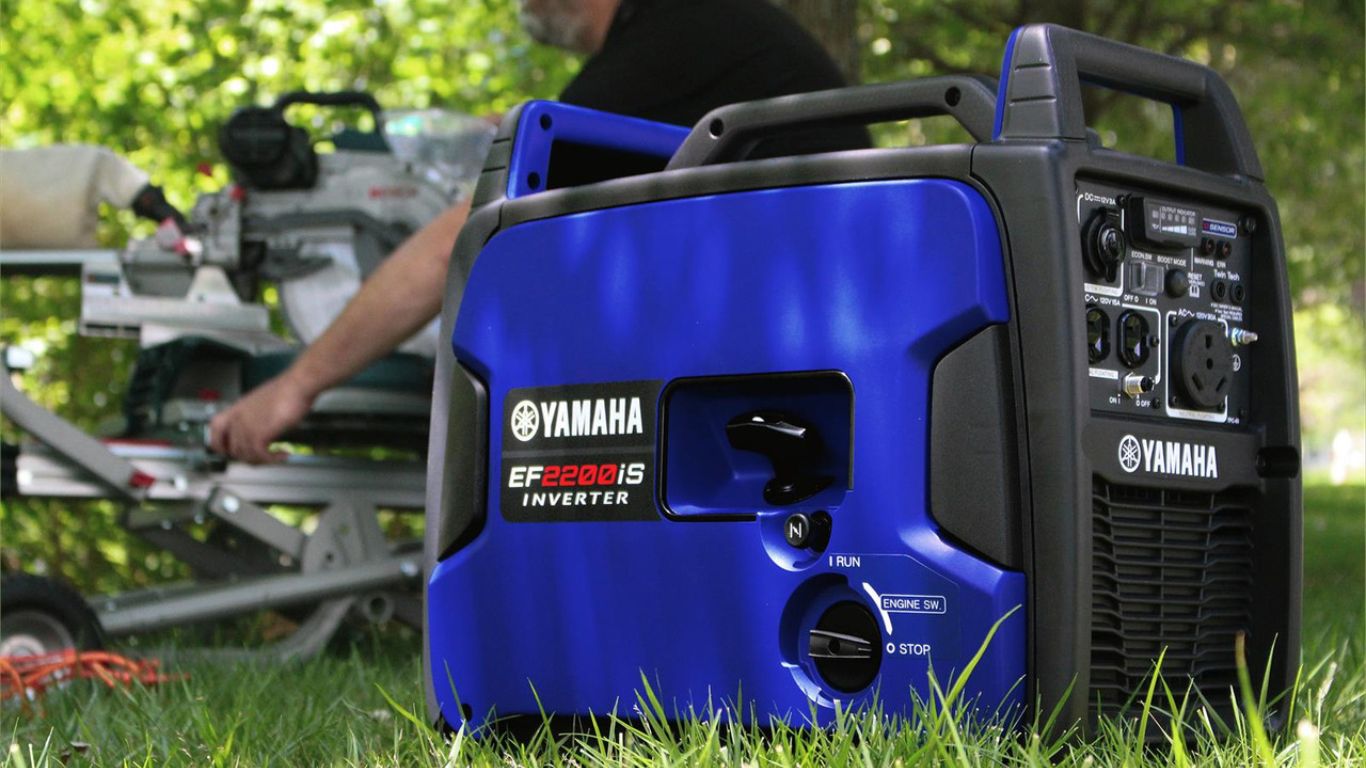
Overview: The Yamaha EF2200iS is a compact and efficient generator. It delivers 2200 watts of power and is designed for easy transport. It features Yamaha’s Smart Throttle, which adjusts engine speed to match the load, improving fuel efficiency and reducing noise.
| Product Features | Pros | Cons |
|---|---|---|
|
|
|
User Reviews: Users like its compact size and fuel efficiency. They find it perfect for short camping trips and easy to transport. Some mention the higher price, but they agree it offers good value for its size and performance, especially with its reliable power output and quiet operation.
Practical Tips for Using Generators While Camping
Using a generator while camping can enhance your outdoor experience, but it requires careful handling. To make the most of your generator and ensure safety, follow these practical tips on safety, maintenance, and usage.
Safety Tips
1. Place the Generator Outdoors: Always operate your generator outdoors. Carbon monoxide from the exhaust is harmful and can be deadly. Ensure the generator is placed in a well-ventilated area, away from tents and living spaces.
2. Use a Transfer Switch: When powering a campsite, use a transfer switch to connect the generator to your electrical system. This prevents backfeeding, which can damage the generator and create a safety hazard.
3. Keep Fuel Safely Stored: Store fuel in approved containers and away from the generator. Avoid refueling while the generator is running. Spills and leaks can be dangerous, so handle fuel carefully and clean up any spills immediately.
4. Follow Manufacturer Guidelines: Read and follow the manufacturer’s safety instructions. This includes proper grounding, recommended maintenance schedules, and operating procedures.
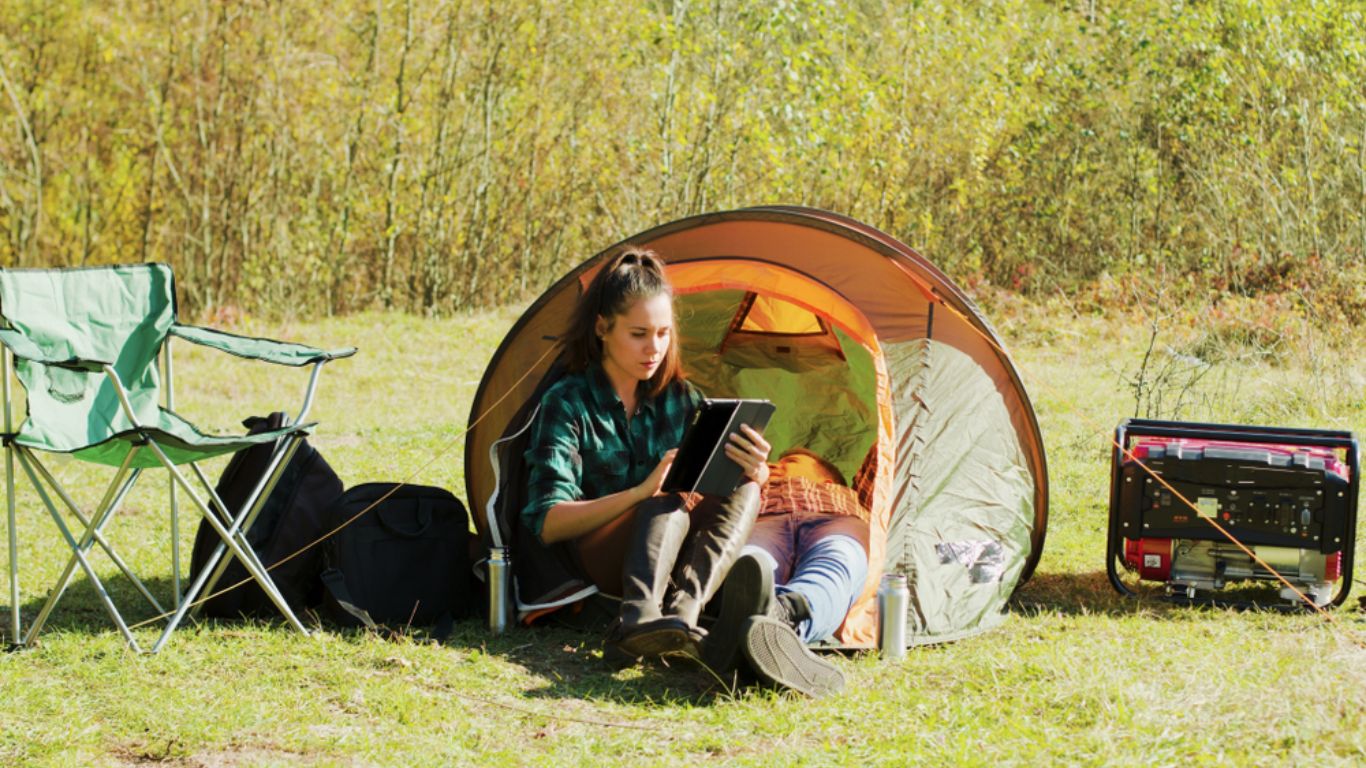
Maintenance Tips
1. Regular Inspections: Inspect your generator before each use. Check for any signs of damage or wear, such as leaks or loose parts. Ensure the air filter, oil level, and spark plug are in good condition.
2. Clean After Use: Clean the generator after use to remove dirt and debris. This prevents buildup that can affect performance. Keep the area around the generator clean and free of flammable materials.
3. Store Properly: When not in use, store your generator in a dry, sheltered area. Protect it from the elements to prevent rust and damage. Use a cover if necessary, and ensure the generator is cool before storing.
4. Perform Routine Maintenance: Follow the manufacturer’s recommendations for routine maintenance. This includes changing the oil, replacing the air filter, and inspecting the spark plug. Regular maintenance ensures optimal performance and longevity.
Usage Tips
1. Calculate Power Needs: Determine the power requirements of your devices and appliances. Choose a generator with sufficient wattage to handle your needs. Overloading the generator can lead to damage and reduce efficiency.
2. Use Energy Efficiently: Turn off devices and appliances when not in use. This conserves fuel and maximizes the generator’s run time. Use energy-efficient appliances to reduce overall power consumption.
3. Monitor Fuel Levels: Keep an eye on fuel levels and refill as needed. Running the generator with low fuel can cause it to stop abruptly, affecting your devices and causing inconvenience.
4. Avoid Overloading: Avoid running too many devices simultaneously. Check the generator’s wattage capacity and make sure not to exceed it. Overloading can cause the generator to overheat and potentially fail.
Using a generator while camping can greatly enhance your comfort and convenience. By following these practical tips on safety, maintenance, and usage, you ensure a safe and efficient camping experience. Invest in a quality generator, handle it with care, and enjoy your time outdoors with peace of mind.
FAQs
1. What is the best overall compact generator for camping?
The Honda EU3000i is widely regarded as the best overall compact generator for camping. It offers reliable power output, quiet operation, and excellent fuel efficiency. Users appreciate its long run time and advanced inverter technology, which provides stable power for sensitive electronics.
2. Which compact generator is best for budget-conscious campers?
The Craftsman 2500i Inverter is a top choice for budget-conscious campers. It provides a good balance of power and affordability, making it suitable for basic camping needs. Its lightweight design and ease of use are additional benefits.
3. What is the quietest compact generator for camping?
The Honda EU2200i is known for its exceptionally quiet operation. It operates at noise levels comparable to a normal conversation, making it ideal for noise-sensitive environments like campsites. Users highly rate its quietness and reliability.
4. Which compact generator is best for RV camping?
The Champion Power Equipment 4500 is the best choice for RV camping. It offers high power output and features an RV-ready outlet. Its ease of use and digital display for monitoring power usage make it a favorite among RV owners.
5. What are the key features to look for in a compact generator for camping?
*When choosing a compact generator for camping, consider the following key features:
- Portability: Look for a lightweight and compact design for easy transport.
- Power Output: Ensure the generator provides sufficient wattage for your needs.
- Noise Level: Opt for a model with quiet operation to maintain a peaceful campsite.
- Fuel Efficiency: Choose a generator with good fuel efficiency for longer run times.
- Ease of Use: Look for features like easy start mechanisms and minimal maintenance requirements.*
Conclusion
Marion Woods is an accomplished generator technology expert with over 15 years of experience, currently serving as the Chief Technology Officer at GenTech Power Solutions. She holds a Master’s degree from MIT and specializes in enhancing generator efficiency and integrating renewable energy sources. Marion is a respected author and speaker in the engineering community, dedicated to pioneering sustainable power solutions.
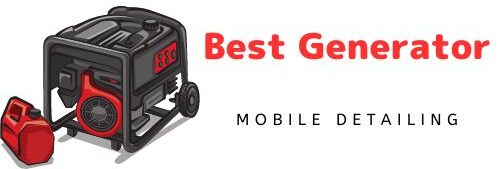
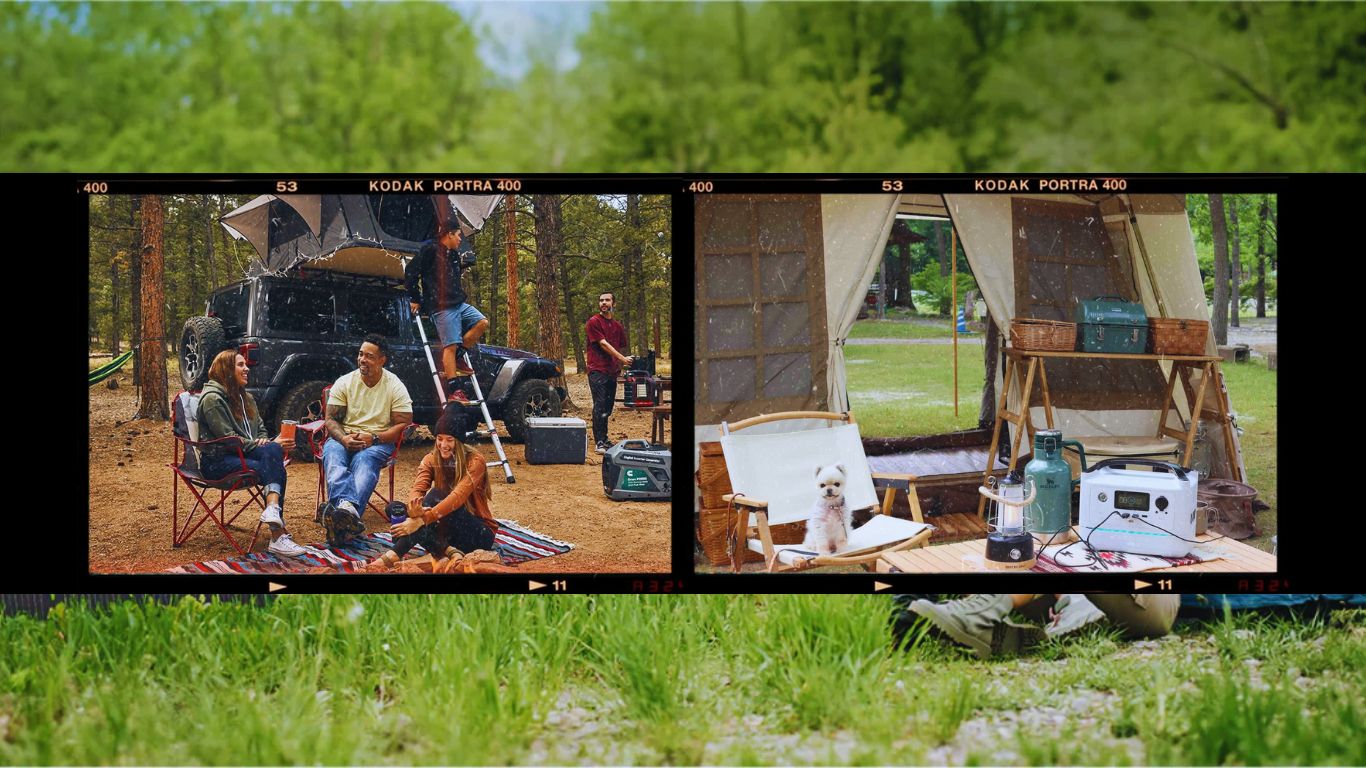
1 thought on “Top 5 Compact Generators for Camping”